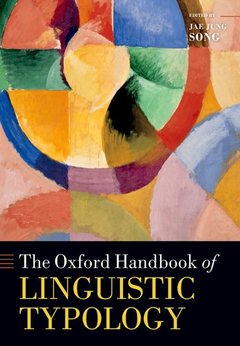Description
The Oxford Handbook of Linguistic Typology
Oxford Handbooks Series
Coordinator: Song Jae Jung
Language: English
Subjects for The Oxford Handbook of Linguistic Typology:
Publication date: 03-2013
776 p. · 17.2x24.6 cm · Hardback
776 p. · 17.2x24.6 cm · Hardback
Description
/li>Contents
/li>Biography
/li>
This handbook provides a critical state-of-the-art overview of work in linguistic typology. It examines the directions and challenges of current research and shows how these reflect and inform work on the development of linguistic theory. It describes what typologists have revealed about language in general and discovered (and continue to discover) about the richly various ways in which meaning and expression are achieved in the world's languages. Typological research extends across all branches of linguistics. The degree to which the characteristics of language are universal or particular is crucial to the understanding of language and its relation to human nature and culture. This book is an essential source of reference for linguists of all theoretical persuasions. It is a vital companion for all those working in linguistic typology or undertaking linguistic fieldwork on one or more languages.
Part I: Foundations: History, Theory, and Method. 1. The (Early) History of Linguistic Typology. 2. The Pioneers of Linguistic Typology: From Gabelentz to Greenberg. 3. Linguistic Typology and the Study of Language. 4. Explaining Language Universals. 5. The Problem of Cross-linguistic Identification. 6. Language Sampling. Part II: Theoretical Dimensions of Linguistic Typology. 7. Markedness: Iconicity, Economy, and Frequency. 8. Competing Motivations. 9. Categories and Prototypes. 10. Implicational Hierarchies. 11. Processing Efficiency and Complexity in Typological Patterns. 12. Language Universals and Linguistic Knowledge. Part III: Empirical Dimensions of Linguistic Typology. 13. Word Order Typology. 14. Word Classes. 15. Case-Marking Typology. 16. Person Marking. 17. Transitivity Typology. 18. Voice Typology. 19. Grammatical Relations Typology. 20. Typology of Tense, Aspect, and Modality Systems. 21. Syntactic Typology. 22. Morphological Typology. 23. Semantic Typology. 24. Typology of Phonological Systems. Part IV: Linguistic Typology in a Wider Context. 25. Linguistic Typology and Historical Linguistics. 26. Linguistic Typology and Language Contact. 27. Linguistic Typology and First Language Acquisition. 28. Linguistic Typology and Second language Acquisition. 29. Linguistic Typology and Language Documentation. 30. Linguistic Typology and Formal Grammar. References. Author Index. Language Index. Subject Index.
Jae Jung Song is Associate Professor of Linguistics at the University of Otago. His books include Causatives and Causation: A Universal-Typological Perspective (Addison Wesley Longman 1996); Case, Typology and Grammar, co-edited with Anna Siewierska (Benjamins 1998); Linguistic Typology: Morphology and Syntax (Pearson 2001); The Korean Language: Structure, Use and Context (Routledge 2005); and Frontiers of Korean Language Acquisition (Saffron Books 2006). He has held visiting appointments with Max Planck Institute for Evolutionary Anthropology (Leipzig), and La Trobe University (Melbourne).
© 2024 LAVOISIER S.A.S.
These books may interest you

Linguistic Typology 208.65 €



